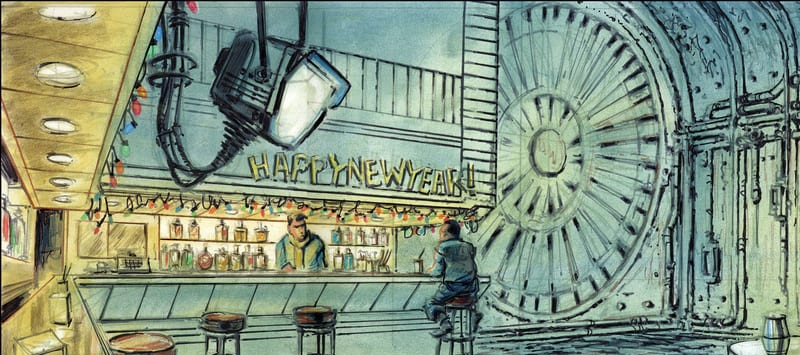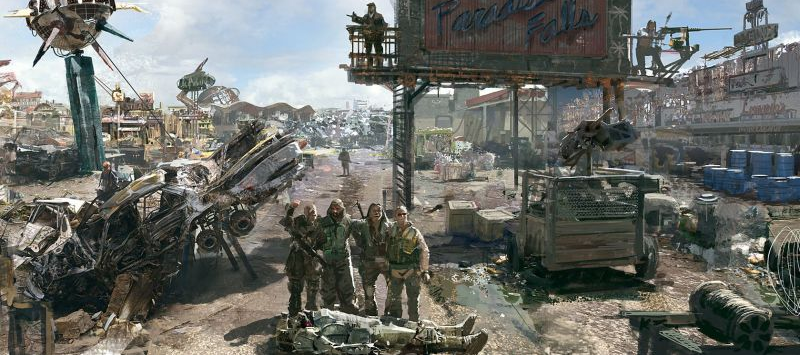Overhaulout Part One: New Game
If someone hasn’t alrady heard that
Fallout 3‘s story stinks, they probably don’t care—and they don’t really have to,
It doesn’t matter if you can line up all the ways the game’s characters were thin, the plot didn’t make much sense, and the choices were odd and insubstantial. A fan of the game might listen, might even end up agreeing. They’ll nod, shrug, and admit that yeah, it sure wasn’t Shakespeare. Congratulations! You’ve successfully argued that the story of
Fallout 3 is bad. But thought it might seem self-evident, you haven’t actually made an argument that the bad story made the game much
worse to play, and that a good story would have made them like it even more. The fan is a fan for a reason. They didn’t hallucinate a better storyline than existed, they were just satisfied with the moral choices and combat and exploration and worldbuilding that they got. If they didn’t really notice or care that the economy didn’t make sense, how can you effectively argue that the game would have been more worthy if it did?
At the end of the day, the only sensible thing to do is accept the disagreement, allow people to enjoy things, and move on. And instead of doing all that, I’m rewriting
Fallout 3.
Actually, mostly just the big parts. And of those big parts, as little as possible.
The goal here is simple: I’m trying to address the idea that a different approach to characters, storylines, and setpieces
would have made
F3 even more enjoyable. That some of the game’s largess was wasted on dead wood, and some of its best story features were underdeveloped and neglected. That there was more fun that we never got to have.
This exercise is most certainly not about:
- Reinventing the game to make it “mine,” or “real Fallout.” I’m not going to question the game’s grand design. If Bethesda decided early on they wanted super mutants, the mean fascist Enclave as villains, the brave virtuous Brotherhood of Steel as heroes, and the GECK as a deus ex machina that helps purify DC’s water supply, then I’m going to overrule the OG Fallout lore-keepers and keep all that in my treatment. If I was making my own game, I probably wouldn’t have a good side the player has to join and a bad side the player has to fight. But I have made my “own” games, and none of them were as successful as bootleg Fallout 3 mouthwash. As much as possible, I’m going to trust in the building blocks Bethesda chose to use; where my treatment varies will have more to do with mortar and the arrangement.
- Suggest any alterations or improvements to the game’s engine, mechanics, or world map. I think Megaton is a little silly, it’s uninspired for the charm perks to be exclusively heterosexual, and Speech shouldn’t involve a die roll. But I’m not going to touch these decisions. Mostly, this is because if I start changing the whole game it’ll become decreasingly possible to say if my alterations are improving anything. It’s easy to imagine an ideal version of a game that doesn’t exist, and claiming that this fake game would be better than a real one is even less useful than just asking you to imagine different writing.
- Proving I’m “better” than Bethesda’s writers. Firstly, I have absolutely no guarantee that you or anyone else will agree that my treatment works better. I’m throwing this out there as a thought exercise, no triumphant flourish, no filled-out application letter. Even if you do think you like my version better, please remember that I’m not only editing an existing draft, I haven’t had to preserve its merits through dozens of editing sessions, discussions with corporate, distillations through dialogue writers, encounters with scripters (“It turns out that whenever an NPC says ‘goodbye’ in a wistful voice, the game crashes on Windows XP?”), and voice-acting sessions. In short, writing for games is hard. Writing this series is easy.

So what am I trying to accomplish? Mostly, these goals:
- Involve players more actively in their journey. We don’t need a hundred-branched story where a choice of omelette in Act One changes the entire course of history. But at the same time, the player should never feel like a tourist—a passive participant in a one-size-fits-all narrative. Choices should be presented during the main quest not because they offer diverse branches and replay-fodder, but because they invite the player to consider the world’s struggles, question, and moral conflicts from a personal perspective.
- Adjust the tempo and attitude of certain sections. Whenever a section is too long, or too awkward, or gives an NPC all the important lines while nailing the player to the ground, I’ll propose adjustments.
- Add depth to the game’s central characters. This is key. I won’t be inventing any characters of my own, nor will I make drastic alterations. I will do my best to preserve the soul and narrative relevance of each NPC. But whenever I find a villain nonspecifically cold and imposing and antagonistic, or an ally blandly supportive and passionate and altruistic, I’ll try to add something a little more substantial than an idiosyncratic mode of speech or recognizable voice actor. Internal conflicts, relatable motivations, or some intriguing feature of origin all help to make flat characters memorable.
- Ground actions as firmly as possible in reason. The player should always have a satisfying answer to the question, “Why was this done by an NPC?” and an even better answer to “Why must I do this?” Care must be taken not to rely on the power of a quest arrow to motivate a player. It’s true that real people aren’t always reasonable, but people do always do things for a reason, and stories should establish these reasons well—even, and in fact particularly, when this reason is “because the character isn’t too bright.”
- Respect the game’s themes. Because games are stronger when they have ideas, and when they remember and revisit those ideas. The first and last scene should share more than just a reference to the same piece of scripture; they should provide a question and an answer.
This last point brings me to my first hurdle. I want to do my best to preserve and reinforce the existing main theme of
Fallout 3‘s storyline. Which is, what exactly? “People should be helped?” That’s your father’s driving motivation, and the main quest obliges it to be yours, but considering the rest of the game is happy to present you opportunities to screw over your fellow man and have the time of your life doing it? The game’s freedom is absolutely an asset, but it stands at odds with any one-dimensionally moralist reading of its central theme. You could instead argue the game’s about legacy, since everything you do is to honor your father and complete his work. Then again, this isn’t something that’s explored or discussed; it’s just an implicit assumption the game makes of you, backed up by the dancing of the quest arrow and trickle of XP. Besides, your mother’s barely mentioned after she dies giving birth to you in the first scene. “Legacy” isn’t something the game’s really interested in exploring, it’s just a hazy emotional hook to keep you following the main quest. Well, what about sacrifice? Your mother dies giving birth to you, you and your father die in the service of the purifier…but what reflection is made on these sacrifices, in word or in action? How do these sacrifices really relate to the rest of the story? Just because they happen a few times doesn’t mean the game is really about them.
If we’re going to identify a central theme, it should be something that allows for multiple kinds of characters and informs your actions from the beginning to the end. I think the best we can do is:
It is Good for the powerful to give strength to the weak.
Why would it be Good for your father have the means to make water clean on a grand scale? Because he would give it freely, putting the thirsty beyond his or anyone else’s power to exploit. Why would it be Bad for the Enclave have the water purifier? Because they could use that to extort those in need. Why do you want it once your father’s out of the picture? Because you are Good, and wish to use your strength over the Enclave to grant strength to others; because you are Bad, and wish to use your strength over the Enclave to take their leverage over other human beings for yourself.[1]
This doesn’t seem like it’s far from what
Fallout 3‘s already going for, although if so we’ve already put it more clearly here than the game ever does. But just because we’ve pegged it to the game’s central choice doesn’t mean we can put the theme in storage again, oh no. Every major NPC, town, quest, and component of backstory should in some way come back to this idea. This should be far from the
only theme, but in a small way, every playsession should contain dialogue and choices that speak to the player’s final actions in the game.
Enough prep work. Let’s roll those developer logos and hit “New Game.”
Ron Perlman’s Exquisite Intro
Blah blah the bombs dropped blah blah vaults blah blah you’re in one. It’s ruled by a powerful overseer, and nobody knows how bad things really are out there because nobody ever enters and nobody ever leaves.
Thank you, Mr. Perlman. Always an honor.
Vault 101: Lair of the Overseer
So riddle me this: we just spent all that time listening to Ron Perlman exposit that we live in a Vault where people have cozy if tightly-controlled prepackaged lives safe from a radioactive wasteland outside. Having established this quite economically, how much time do we actually need to spend establishing the culture and day-to-day life of the Vault we’re about to leave semi-permanently? Does it have to be, say, the unskippable first hour of your replayable RPG…especially when it barely does anything to introduce the precipitating incident, your father’s departure? As it stands, his vanishing fails to qualify even as a mystery. It’s too random; there’s nothing to wonder about because we clearly have none of the necessary clues.
Let’s try this. Why don’t we have Mr. Perlman explain that the player a.) grew up in a super-clean fancyland which has b.) no accessible exit and c.) a tyrannical overseer, and see if we can’t just jump-start right to the good stuff from there? Does the player not have enough information to cut right to scenarios more relevant and interesting than “childhood bully wants pastry” and “standardized testing is stressful”? It’d be one thing if we were setting up an idyllic contrast to the real, vital struggles of the Wasteland, but considering that in the current draft the player goes from “flunking a test” to “murdering people with a baseball bat” without much of an arc or adjustment period I’d argue we’re not losing anything by skipping to the drama.
I’m gonna cash in a “total rewrite” chip here. Let’s go out on a limb together and give the player a resonant, modestly tense scene that gives our father tangible motivation for suddenly removing himself from the vault.
Vault citizenship registration renewal form: choose face, gender, name. Details on screen show you’ve got a mother (deceased) and a father who’s the “chief doctor” of the Vault. Your own work duty is presently “unassigned.”
You’re awoken by the sound of a distant alarm, and then a hammering on the door from somewhere nearby. First objective: investigate. Player learns mouselook, movement keys, how to “use” the door controls.
Your door leads to one end of a very nice-looking foyer. All along the wall are chemistry experiments and computer terminals. There are windows, through which you see alarms flashing and heavily-armed security bots stomping on patrol. The hammering has stopped, however, and through the door at the end of the foyer you can hear the sounds of urgent conversation.
You find through the door a doctor’s office. Blood trails from the entrance to an operating table, on which a man is laid with a medical bot standing next to him. A man in a lab coat who the interface identifies as “Dad” says, “Go to the hall closet, get my spare stimpacks. If we don’t neutralize the plasma residue in his wound his lungs are going to burst.”
Your responses read:
Dad, it’s after Curfew. What’s going on?
Did you not see the Overseer’s bots out there? We’re harboring a fugitive!
Stimpacks, hall closet. I’ll be back.
The first two options mostly exist to contextualize the scene; by presenting these as possible reactions, we understand these reactions to be reasonable and appropriate. If we choose to be just a little less than instantly helpful, we acknowledge that it is unusual for a patient to be brought in after a “curfew” enforced by the vault’s authority. We may also express concern at the idea of harboring a “fugitive,” which establishes that the Overseer is probably the man responsible for the fellow’s injuries and that it’s bad news to help someone like that. Expressing this much doubt will lead your dad to calmly assert that, “I cannot decide what the Overseer does. I can decide what I do, and I’ve decided to treat this man without condition.”
Once he has the stimpacks, he says, as he examines the man, that he heard over the PA system that a citizen was trying to modify the water tanks to give his family more than the rationed amount, and that he’d been hit by a security robot. Once again, you have the option of expressing serious concerns about trying to save someone the Overseer wouldn’t want treated. Your father continues to assert that he doesn’t choose who he helps—
that he will give his gift to anyone who comes to him for aid, not just the “right” people. As the Overseer’s robots come to the door and demand to know the status of the fugitive, you are told to administer drugs to the man using the computer terminal while your father stalls for a few moment’s time. The computer allows you to administer treatment (and “cure” the man, at the expense of what looks to be expensive medicine), stabilize the man with a general drug, or allow the man to die where he sits. In other words, you’re being asked to decide how seriously you take your father’s ideals.
As your treatment concludes, the doors open. The Overseer enters with his bots and briefly berates your father for healing a “poor citizen,” asserting that a doctor is only “useful” if he “maintains the public good.”
Your father’s reaction makes it clear whose “good” he is really being asked to serve; that he is being used as an asset of control. In a display of control, both you and he are asked to return to the rest of the apartment and leave the Overseer alone with the wounded man in the doctor’s office. You have the option, before finding your way back, of speaking briefly with the Overseer and his bots, who will happily provide their perspective on the role of specialists in a tightly-organized society.
When you rejoin your father, he seems faraway. You may discuss your choice with him, contemplate the fate of the wounded man, and wonder aloud about the fate of the vault. It’s clear that your father has reached some kind of decision.
The next morning, he’s gone.
NEXT WEEK: VAULT 101, MEGATON, and THREE DOG
































![Have Many Potato [2013] Codex 2013](/forums/smiles/campaign_tags/campaign_potato2013.png)



